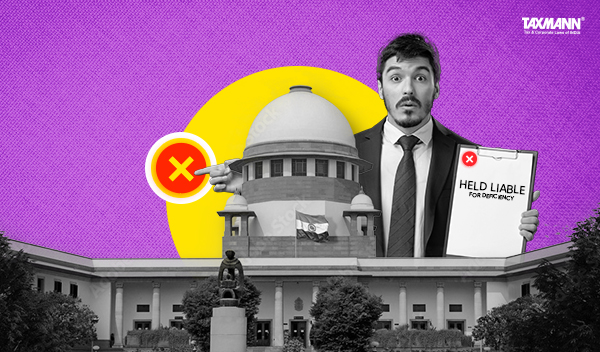Advocates Can’t Be Held Liable for Deficiency in Services Under the Consumer Protection Act, 1986 | SC
- Blog|News|Company Law|
- 2 Min Read
- By Taxmann
- |
- Last Updated on 16 May, 2024

Case Details: Bar of Indian Lawyers v. D. K. Gandhi PS National Institute of Communicable Diseases - [2024] 162 taxmann.com 461 (SC)
Judiciary and Counsel Details
-
- Bela M. Trivedi & Pankaj Mithal, JJ.
Facts of the Case
In a landmark judgment, the Supreme Court clarified that lawyers’ services are not covered under the Consumer Protection Act. This decision revisits a 2007 ruling by the National Consumer Disputes Redressal Commission (NCDRC), which had previously held that legal services fell under Section 2(o) of the Consumer Protection Act.
Supreme Court Held
The Supreme Court was asked to determine if complaints alleging ‘deficiency in services’ against practising advocates are maintainable under the Consumer Protection Act, 1986, as re-enacted in 2019. The Court emphasised that the Consumer Protection Act’s purpose is to shield consumers from unfair and unethical business practices. The Legislature, it noted, did not intend to include professional services within the scope of the Act.
Highlighting the unique nature of the legal profession, the Court explained that the relationship between a client and an advocate is distinct. Advocates act as agents for their clients, owing fiduciary duties and respecting client autonomy. Clients exert significant control over how advocates perform their duties in court, strengthening the argument that legal services constitute a personal service contract.
The Court underscored that professionals, unlike businessmen, require high levels of education, skill, and mental effort. Their success often hinges on factors beyond their control. Thus, treating professionals as equivalent to businessmen under the Consumer Protection Act is inappropriate.
Conclusively, the Supreme Court ruled that services hired from an advocate fall under “a contract of personal service” and are thus excluded from the definition of “service” in Section 2(42) of the Consumer Protection Act 2019. This decision reinforces the exclusion of legal services from the Consumer Protection framework.
Disclaimer: The content/information published on the website is only for general information of the user and shall not be construed as legal advice. While the Taxmann has exercised reasonable efforts to ensure the veracity of information/content published, Taxmann shall be under no liability in any manner whatsoever for incorrect information, if any.

Taxmann Publications has a dedicated in-house Research & Editorial Team. This team consists of a team of Chartered Accountants, Company Secretaries, and Lawyers. This team works under the guidance and supervision of editor-in-chief Mr Rakesh Bhargava.
The Research and Editorial Team is responsible for developing reliable and accurate content for the readers. The team follows the six-sigma approach to achieve the benchmark of zero error in its publications and research platforms. The team ensures that the following publication guidelines are thoroughly followed while developing the content:
- The statutory material is obtained only from the authorized and reliable sources
- All the latest developments in the judicial and legislative fields are covered
- Prepare the analytical write-ups on current, controversial, and important issues to help the readers to understand the concept and its implications
- Every content published by Taxmann is complete, accurate and lucid
- All evidence-based statements are supported with proper reference to Section, Circular No., Notification No. or citations
- The golden rules of grammar, style and consistency are thoroughly followed
- Font and size that’s easy to read and remain consistent across all imprint and digital publications are applied



 CA | CS | CMA
CA | CS | CMA

Insightful analysis on advocates’ liability under the Consumer Protection Act. Your blog provides clear, valuable information on this important legal issue. Thanks.
Great analysis on why advocates aren’t liable under the Consumer Protection Act. Clarifies the limits of legal service responsibilities.